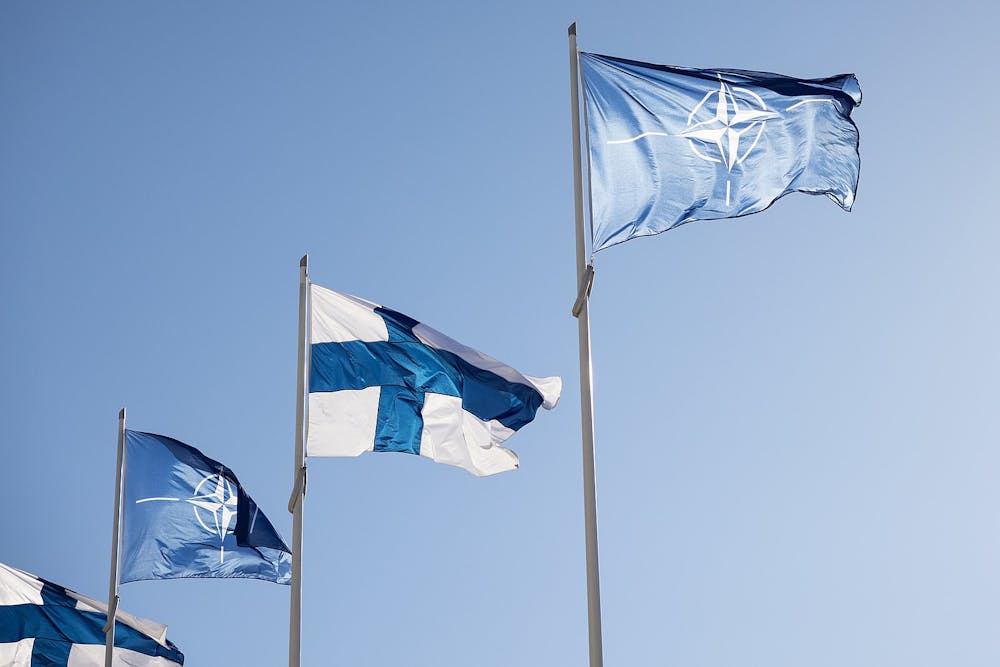By Nicole Trinkl
Staff Writer
More than a year after Russian forces invaded Ukraine on Feb. 24, 2022, President Vladimir Putin has continued to increase efforts to gain more territory and control over Ukraine. More recently, Russia's plan to put tactical nuclear arms in Belarus has raised concerns of possible escalation. Some E.U. members, such as Finland, have since joined NATO, further forming and distinguishing countries' alliances.
On March 25, Putin announced Russia's deal with Belarus to station tactical nuclear weapons on its territory.
According to Al Jazeera, Belarus decided to host Russian arms in its country. Belarus's foreign minister, Sergei Aleinik, said that after years of pressure from the U.S. and E.U. members to change their political and geopolitical direction and rising national security concerns, Belarus has no choice but to "[strengthen] its own security and defense capabilities." The government expressed that Russia's nuclear plans would not violate international non-proliferation agreements, as Belarus itself would not have any control over the weapons.
Putin expressed that Belarus's President, Alexander Lukashenko, has long pushed Russia to station nuclear arms in his country. Both Belarus and Russia have had strong military ties. As Lukashenko has mentioned several times, Russia has even helped modernize Belarus’s warplanes to be able to carry nuclear weapons.
Putin said that deploying Russia's tactical nuclear weapons to Belarus was in part a response to the U.K. deciding to provide Ukraine with armor-piercing shells which contained depleted uranium.
During a press hearing, Putin criticized how there have been various instances in which other countries, specifically the United States, have put nuclear weapons in territories like Belgium, Germany, Italy, the Netherlands and Turkey. Putin explained that he is taking the same actions as the United States is doing with Belarus.
"Why do Americans deploy nuclear weapons [to] their allies on their territory [and] train the crews, pilots, how to use their type of weapon?” Putin said. “We agree that we will do the same — without violating our obligations, I emphasize, without violating our international obligations on the non-proliferation of nuclear weapons."
According to the U.S. State Department, since the beginning of 2023, the U.S. has been working on ensuring that the Russian Federation and the Lukashenka regime take accountability and pay for Russia’s actions against Ukraine through economic sanctions, export controls and airspace restrictions.
In response to Putin's continuous aggression since the beginning of the war, many E.U. members fear escalation and a possible outbreak of an even bigger conflict. According to the North Atlantic Treaty Organization, Finland and Sweden applied to join NATO on May 18, 2022, almost three months after Russia started annexing parts of Ukrainian territory. A little over a year later, NATO approved Finland's membership request.
According to the North Atlantic Treaty Organization, Finland officially joined NATO on April 4. Finland is the most recent country that has joined NATO since Ukraine’s invasion, and it was the fastest accession process in NATO's history. NATO allies signed Finland's Accession Protocol on July 5, 2022.
A ceremony formally welcoming Finland as the 31st NATO member was followed by the raising of Finland's flag at NATO's headquarters in Brussels. NATO Secretary General Jens Stoltenburg and President of Finland Sauli Niinistö both spoke. During his speech, President Niinistö explained Finland's past history of military non-alignment and why it decided to join NATO. Niinistö made clear that he wants to ensure Finland’s security and enhance its international standing.
"Finland's membership is not targeted against anyone, nor does it change the foundations or objectives of Finland's foreign and security policy,” Niinistö said. “Finland is a stable and predictable Nordic country that seeks peaceful resolution of disputes."
Many hope for Sweden's acceptance into NATO in the coming months for Sweden's security and for NATO.
According to Reuters, Sweden’s membership into NATO seems to be, for now, blocked as both Turkey and Hungary do not support Sweden joining the alliance.
Turkey is not supportive of Sweden joining NATO for accusations each country has of one another. For one, Sweden has criticized Turkey for its past human rights abuses. Turkey has accused Sweden, specifically Stockholm, of harbouring members of a terrorist group, Kurdistan Workers Party. Turkey's general election in May, however, may lead to voters' support of Sweden’s NATO issues. If Turkish President Recep Tayyip Erdoğan loses and an opposition leader wins the election, that could boost Sweden's chances of getting support from Turkey.
Hungary, on the other hand, has claimed that Sweden has had a hostile attitude towards them as Sweden criticized Prime Minister Viktor Orban. Hungry needs past criticisms to be addressed before it approves Sweden’s accession to NATO.
In light of these disputes, as long as Putin’s pursuit to invade Ukraine persists, and Russia’s actions escalate, countries on both sides will continue to take steps to declare their allyship with either country. Whether Russian or allied actions will lead to further escalations is uncertain.







